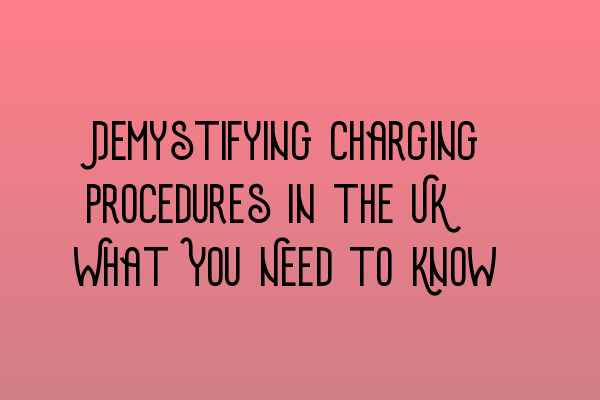Demystifying Charging Procedures in the UK: What You Need to Know
As a legal professional, it is essential to understand the charging procedures in the UK criminal justice system. Whether you are an aspiring solicitor preparing for the SQE exams or an experienced lawyer looking to update your knowledge, this blog post will provide you with valuable insights into the charging process.
Understanding the Charging Decision
The charging decision is the crucial step in the criminal justice process where the Crown Prosecution Service (CPS) decides whether to charge someone with a criminal offense. This decision is based on the evidence collected by the police during their investigation. Factors such as the strength of evidence, public interest, and the seriousness of the offense are taken into consideration.
If you are preparing for the SQE exams, it is important to have a solid understanding of the charging decision. The SQE Exam Prep: Essential Study Materials for Aspiring Solicitors article can provide you with useful resources to enhance your knowledge in this area.
Different Types of Charges
Once a decision to charge has been made, the CPS can choose from a range of charges depending on the nature and seriousness of the offense. These charges can vary from minor offenses such as theft to more serious crimes like murder. Each charge carries its own set of penalties and consequences.
If you want to learn more about the different types of charges, the article Demystifying the Solicitors Qualifying Examination Format provides in-depth information on this topic.
The Charged Person’s Rights
Once a person has been charged with a criminal offense, they are entitled to certain rights under the law. These rights include the right to legal representation, the right to remain silent, and the right to a fair trial. It is crucial for solicitors to understand these rights in order to provide effective legal assistance to their clients.
For international lawyers preparing for the SQE exams, the article SQE Exam for International Lawyers: Challenges and Success Strategies offers valuable insights into the challenges they may face and strategies for success.
Challenges in Charging Procedures
While the charging procedures in the UK aim to ensure fairness and justice, there are challenges that can arise during the process. These challenges can include issues with evidence gathering, inconsistencies in police practices, and potential biases. Solicitors must be aware of these challenges in order to provide the best possible defense for their clients.
If you are an entrepreneur considering LLC formation and want to ensure you are complying with legal requirements, the step-by-step guide in the article LLC Formation: A Step-by-Step Guide for UK Entrepreneurs can help you navigate through the process.
Conclusion
Understanding charging procedures in the UK is essential for solicitors and legal professionals. By being familiar with the charging decision, different types of charges, rights of the charged person, and challenges in the process, you can provide effective representation and ensure justice is served.
For more information on related topics and exam preparation, be sure to check out the links provided throughout this article. Good luck with your studies and legal career!
